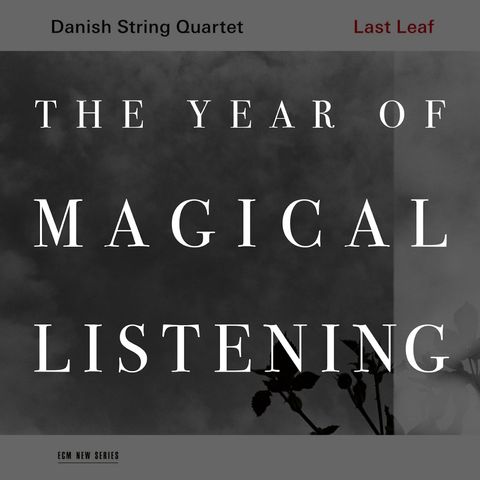003 :: QUARTET

FEATURING Last Leaf by Danish String Quartet, released by ECM Records in 2017. https://songwhip.com/danish-string-quartet/last-leaf / https://ecmrecords.bandcamp.com/album/last-leaf-1 - https://songwhip.com/danish-string-quartet/despair-not-o-heart-arr-for-string-quartet - https://songwhip.com/danish-string-quartet/shore - https://songwhip.com/danish-string-quartet/sorensen-shine-you-no-more TRANSCRIPT What even is a string quartet today?...
show moreLast Leaf by Danish String Quartet, released by ECM Records in 2017. Listen / Buy direct
TRANSCRIPT
What even is a string quartet today? Do we need them anymore? What new could they possibly have to say? To many, the string quartet may seem like a dead language: beautiful, self-contained, but of things past, an object of study rather than a living medium.
This is all, of course, false, as any number of contemporary string quartets can attest. But this record, by the Danish String Quartet, presents a completely new way to see the string quartet completely anew.
Fittingly, the first sound one hears on the record – the sound you're hearing now – is not even a string instrument, but a keyboard: an organ of some sort, so intimate that you can hear the press of its keys. And yet, what it's playing is a hymn that, we're told, has been "arranged for string quartet", even if it's not played by one.
This opening underlines what I take to be the record's thesis: that the string quartet is not an ensemble or a repertoire so much as it is an orientation, a way of approaching music, whatever music that may be.
In this particular case, the music is old: this record, like many string quartet records, looks backward for inspiration. But rather than looking to the classical music tradition, it looks to the traditional folk songs of Scandinavia – melodies that were around long before the string quartet was canonized, long before the violin, viola, and cello even existed. In this way, the record is not reanimating a tradition so much as it is reimagining a tradition, not merely giving these melodies a four-part string arrangement, but, more deeply, refracting them through a string quartet's sensibility.
And what is that sensibility, that orientation? In my mind, it is characterized by a musical nimbleness, a fluidity in key and tempo. There is an undulation to these performances, in the way the tonal centre can shift and drift between measures, the way the pace will subtly modulate from beat to beat. I can only describe it as the movement of breath, or the movement of the heart, an expression of some vital, ineffable energy.
Great solo performances have this quality as well, being expressions of their performer's own singular energy. Yet with string quartets this experience is amplified, as their singular energy comes from four performers, working in concert, melding their individual energies into one multidimensional voice. Individuality dissolves into union, and what we hear is the sound of an intimate synchronization, of four people coalescing into a piece of music and bringing it newly alive.
The highlight of the record, for me, is "Shine You No More". The song is, essentially, a jig – a simple, looping melody played so fast and energetically that it can only be heard as an exhortation to get up, grab a partner, and dance. It's a performance that can't but set the listener into motion, whether that be a whirling of the body or a tapping of the foot. And so we, too, become synchronized with the music, and the unity between the players becomes a community with their audience.
It is, perhaps, the primordial function of music: to bring us together, by bringing sounds together. Yet here again, the old is refracted through the new: While sonically this performance follows the patterns of traditional dance music, structurally it follows the logic of contemporary dance music, in its dynamic shifts and swells, its four-to-the-floor heartbeat, or its middle section, which is basically one long slow build, and when the drop comes, it's ecstatic. Somehow this song manages to capture at once the poignant beauty and the exuberant joy of music. It's timeless, it's new, it's the essence of the string quartet.
Information
| Author | Willie Costello |
| Website | theyearofmagicallistening.com |
| Tags |
Copyright 2024 - Spreaker Inc. an iHeartMedia Company
